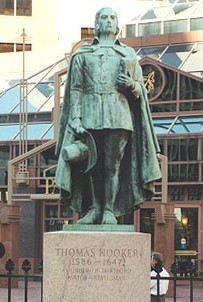
Rev. Thomas Hooker
|
| |||||||||||||||||||||||||||||||||||||||||||
Rev. THOMAS HOOKER was born at Marefield, Leicestershire, England, the son of THOMAS HOOKER and SUSANNAH PYM of Devonshire, on July 7, 1586. He entered Emanuel College, Cambridge, in 1603/04, receiving a B.A. degree in 1607/08, and an M.A. in 1611. He then began the study of divinity, and was elected Fellow of the College, but left school before completing his first course. He started preaching in the Cambridge and London area. He married Susannah Harkes Garbrand, his second wife, on Apr. 3, 1621, in Amersham, Buckinghamshire, England. The name of his first wife, by which he had two children, is not known.
In 1626 he became a lecturer and assistant to the Rev. Mr. Mitchell at Chelmsford, and had the opportunity to speak to noblemen and others of high standing in English society. Rev. HOOKER became a victim of religious persecution. In 1630 he was tried in Spiritual Court at Chelmsford, and silenced for non-conformity. He continued to work nearby, teaching at a school at Little Baddow. After a petition to have him reinstated in the English Church was turned down, he decided to move to Holland. He remained there for three years, first in Amsterdam, then Delft, and finally in Rotterdam.
He then returned to England for a visit, but found that his enemies were still active. He was forced to go into hiding, and in July 1633 he escaped by concealing himself on the ship Griffin, sailing from the Downs. He arrived at Boston, Suffolk, MA, on Sep. 4, 1633, and on Oct. 11 was chosen pastor of the church at Newton, where he remained for the next two years.
But, ironically, the desire for full political and religious liberty ... the impelling motive the drove the first settlers to the shores of New England, was also the chief cause of the formation of many of the interior settlements. When dissensions arose, as was inevitable among the independent pioneers, groups would depart and settle new communities. It was exactly this climate that developed in Boston, as THOMAS and the autocratic Rev. John Cotton found they could not coexist in Newton. Both leaders refrained from an open quarrel, and in 1635 permission was obtained from Governor William Bradford, to establish some settlements along the Connecticut River.
On Oct. 15, 1635, a party of sixty men, women, and children, set out by land for Connecticut. They sent their household goods by ship. The journey was a terrible hardship and the winter one of great suffering. The people from Dorchester settled at Windsor, those from Watertown at Wethersfield, and those from Cambridge at Hartford.
In June, 1636, Rev.THOMAS HOOKER, along with an additional 100 of his followers joined the original group in forming the settlement at Hartford, Hartford, CT, and became identified with all the major developments of the colony. Rev. Roger Newton became a student of his at Hartford, and married his daughter, Mary, in 1644. Rev. HOOKER published many books and sermons between 1637 and his death.
In 1638, Rev. THOMAS HOOKER preached the sermon that led to the adoption of the "Fundamental Orders", the first written constitution in the world that created a government. Today the Old State House, site of that sermon, is a museum in downtown Hartford.
He became ill with a violent epidemic disease and died at Hartford, on July 7, 1647, his 61st birthday. He is buried in the cemetery at Center Church in downtown Hartford. A statue commemorating his life stands at the old State House, about two blocks from where he is buried.
THOMAS left a rather sizeable estate of £1136 15s 00d. Compared with other estates of the time, this would make him one of the wealthy men of the Connecticut Colony. However, it is not known where this wealth came from. After leaving college he had mainly minor clerical positions, probably earning no more than £25 per year. It's doubtful he accumulated much while a refugee in Holland. He owned his house in Newton, and sold it to Rev. Thomas Shepard, his future son-in-law. Again, it is doubtful this asset could have made him wealthy. And, the eleven years that he lived in Hartford would have been more of a struggle for existence than a time to accumulate wealth. It seems extremely improbable that he could have himself accumulated this wealth. It may have come by inheritance from his father, but there is no record to substantiate that as fact.
Later in 1647, the house in which THOMAS lived was demolished. During the demolition, workers found a private receptacle which had been overlooked when the house was emptied in preparation for the demolition. They found papers which had been carefully bundled, probably by THOMAS himself. Without asking anyone, the workers threw the papers in with the rubbish and carted them away to destruction.
After the death of THOMAS, it is believed that SUSANNAH became the wife of Elder William Goodwin and
died in Farmington, Hartford, CT.
| born | marr | died | |
|---|---|---|---|
| children by first wife | |||
| Joanna husband Rev. Thomas Sheperd |
11-05-1605 |
-1640 |
04-28-1646 08-25-1649 |
| Mary husband Rev. Roger Newton |
|
-1644 |
02-24-1675/76 06-07-1683 |
| children by second wife, SUSANNAH HARKES GARBRAND | |||
| John | -1684 | ||
| Anne | 01-05-1626 | ||
| Sarah | 04-09-1628 | 08-26-1629 | |
|
SARAH HOOKER
husband JOHN WILSON, Jr. |
-1629 09- -1621 |
-1647 |
08-20-1725 08-23-1691 |
| Rev. Samuel wife Mary Willet |
-1633 11-10-1637 |
09-22-1658 |
11-06-1697 06-24-1712 |